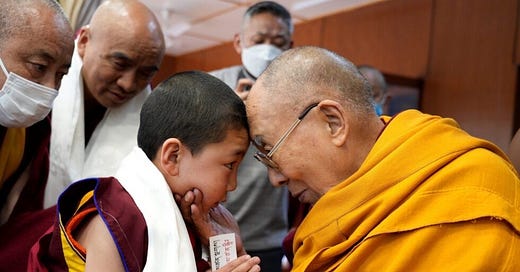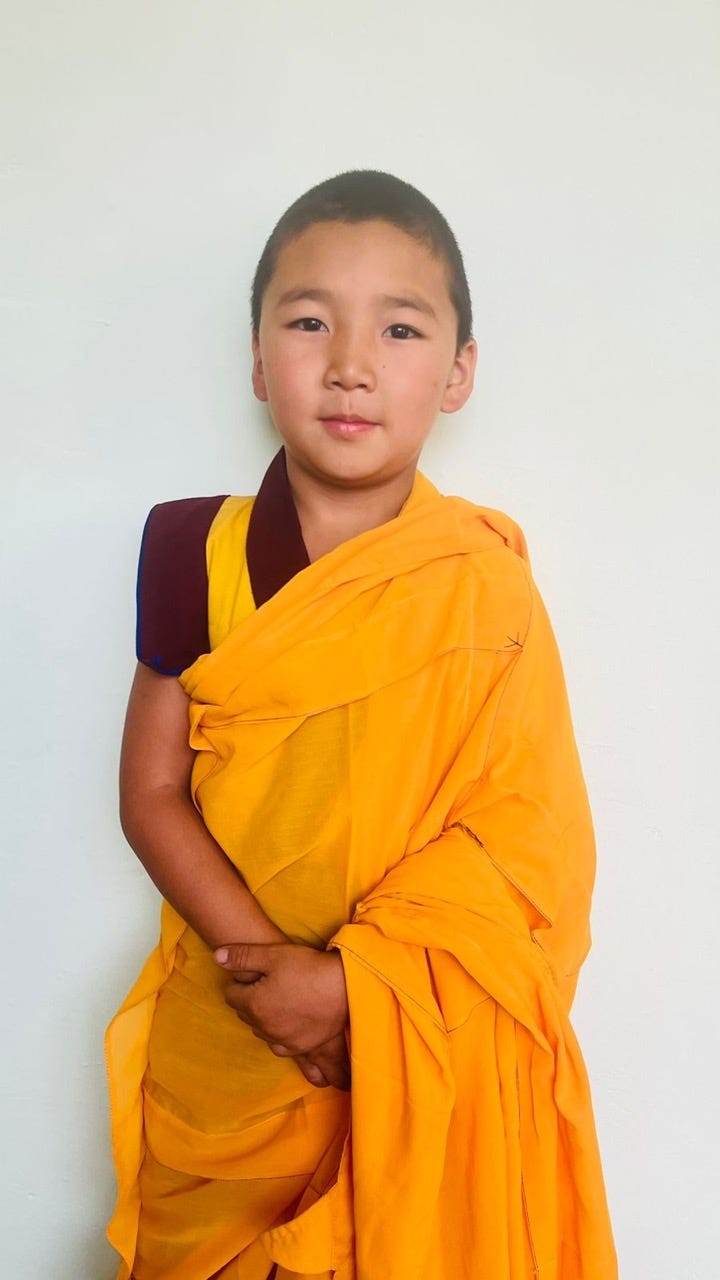It is a my joy to introduce David Michie to my Drip, Drip, Drip readers. David is the author of The Dalai Lama's Cat, a wonderful Substack in which he offers Buddhist teachings and principles in plain English, beautifully written. He is also the author of The Dalai Lama's Cat book series, which is utterly delightful and inspirational. David and I are posting on each other's Substacks today and I know you will enjoy his essay as much as I do.
Three Things I learned from Geshe Acharya Thubten Loden
When fellow writer Cyndi Lee and I found each other on Substack, we discovered a fascinating shared lineage: both her guru and mine were close students of Lama Trijang Rinpoche, who was also a tutor of His Holiness the Dalai Lama. Gelek Rinpoche and Geshe Thubten Loden were together at the Buxa refugee camp when the Tibetan refugees first came out of Tibet in 1959. Buxa was where the high geshes and reincarnate lamas were first sent, before their respective monasteries were re-established or they went on to do other things. Gelek Rinpoche and Geshe Loden knew and respected one another, and each went on to establish Dharma centres in the West – Gelek Rinpoche in Ann Arbor, USA, and Geshe Loden in Melbourne, Australia.
Cyndi and I recently agreed to write a post about the three main things we learned from our revered Tibetan lamas to share with each other – and with you, our readers. Each of us has no idea what the other is going to write. It will be fascinating to compare and contrast!
Keep it real
The immediate teaching that came to mind, thinking about Geshe-la, was his straightforward, down-to-earth, uncompromising authenticity. If you weren’t interested in the Dharma, that was your choice. But if you were interested, he expected you to do the work. To listen, read, study, meditate and set about the business of personal transformation. Otherwise, what was the point?
If Geshe-la sounds ‘old school,’ that’s because he was. Born in Tibet in 1924, he experienced austerities of an order unimaginable to most of us. This included fleeing through the Himalayas in 1959, without proper provisions or clothing, being pursued by Red Army soldiers. So desperate was their hunger, several of his fellow monks took to cutting strips of leather from their boots to chew – a detail I include in my novel The Magician of Lhasa.
Given his background and training, Geshe-la had little tolerance for laziness or emotional excess. When one of his students asked questions during class about a course he had been teaching for some weeks, Geshe-la asked her to fetch her copy of the relevant text. Surprised by the unusual request – Geshe-la’s own copy of the book was open, right in front of him - the young woman returned from her room with her own volume. Geshe-la lifted it in his hands and flicked through its pristine, uncut pages, before handing it back to her in silence. He didn’t have to say anything: his response could hardly be clearer.
On a different occasion, one of his most devoted students, cooking lunch for over 100 retreatants, was looking distressed in the kitchen when Geshe-la stopped by and asked if there was a problem. “We’re doing vegetable tagine and I’ve just found we have no lemon!” explained the student. Geshe-la needed little time to consider this before shrugging. “No lemon,” he said in his Tibetan English, “death not happening.”
For many of us this has become a catchphrase. Faced with a similar mundane disaster, instead of getting caught up in a vortex of futile emotion, better to remind oneself: “No lemon, death not happening.”
Geshe-la walked the talk. Whenever you visited him for a personal audience, he would hand you a small gift as you left – a box of chocolates, perhaps, or biscuits. It didn’t matter that these were re-gifted offerings that he, himself had recently received. He was showing you how to do things. Even after empowerment ceremonies, when he had just bestowed on you the most extraordinary gift of your inner life, after presenting with him a traditional khata (white scarf), he would typically have a large basket filled with apples or pears, one for each student. They tasted all the sweeter with the guru’s blessing!
Enjoy life
As a Geshe Lharampa, holding the highest academic degree in the Gelugpa tradition, by his mid-50s, with his own quarters, attendant and status at Denma College in Sera Je Monastery, Geshe-la was in line to be appointed abbot of one of the major monastic institutions. Despite his dazzling attainments, instead of resting on his laurels he chose, instead, to come to Australia, to teach people with no understanding of the Dharma and certainly none of the instinctive reverence for lamas he experienced in the Tibetan community.
In the early years, far from being the one being waited on, there were times he himself used to wait on his students, carrying meal trays to their rooms in the evenings and trying to coax them to come to class later. Having arrived knowing little English and with no money, under his leadership the Tibetan Buddhist Society went on to acquire two significant properties near Melbourne and Perth respectively, building two traditional Tibetan temples and retreat centres.
A powerful Dharma practice is not, in any way, contradicted by happiness and success in the conventional world. Geshe-la’s life was a showcase of just this. As his centres became more established and he had many long-term students, he often received financial donations, which his students would put into a savings account. He used the money to donate a marble floor to his college temple back in India. On another occasion he took out all the savings and had them exchanged into Rupees – mysteriously, forex deals seemed to work decisively to his advantage – which he then handed out when he visited the monks in his monastery back home. “Look!” he would show his empty savings account gleefully to those visiting him after his latest India trip. “I gave all the money away!” Generosity, like other subjects in the Dharma, wasn’t just to be studied, but to be practiced. Being rich is a good thing if it empowers you to help others.
The material world really did seem to Geshe-la like the sport of appearances. And in this dream-like state between birth and death, if you have the good karma to enjoy a smart car, beautiful clothes or earthy pleasures, then go for it!
That said, Geshe-la also showed us to be sensitive to others’ perceptions. Once offered a lift by a Mercedes-driving student to an official event, he opted instead to be taken in a Toyota. Discernment is necessary.
Dharma works!
When students went to Geshe-la for advice, as they did on all manner of things, there was often a familiarity about what he told them. Sooner or later we would find that he had been quoting from the Lam Rim (Path to Enlightenment) or one of his Vajrayana translations. Given his facility with the Dharma, perhaps arising from years of debate practice, he knew exactly which instruction to apply to any given situation and could access and articulate it immediately.
Dharma wasn’t only to do with meditation and study. It was a 24/7 undertaking. It’s hard to express the degree of matter-of-factness with which Geshe-la dispensed advice. He had a way of cutting through all our ‘on-the-one-hand versus on-the-other’ over-thinking. The Dharma outlines steps to be taken on one’s own, personal journey, and if you follow the steps, you get the results. Simple – if not necessarily easy.
In death as well as life, Geshe-la demonstrated that Dharma works. I wasn’t present at his death, but I am told that his was a textbook illustration of how to die according to the Vajrayana instructions at which he was so very practiced.
Before passing away in 2011, Geshe-la left directions about locating his reincarnation, to be known as Loden Rinpoche. After consultation with His Holiness the Dalai Lama, a search was conducted with the assistance of monks from Sera Je Monastery in Ladakh, a province of India. In July 2023 Loden Rinpoche was identified by His Holiness as the son of a Tibetan nomad family living in that region.
Geshe-la’s reincarnation, Loden Rinpoche, was enrolled at Sera Je Monastery in February this year and has commenced his monastic education. This includes contemporary subjects such as English language, science and mathematics, and also traditional Geshe studies.
Summary
For me, more than anything, Geshe-la showed us that with effort and application, anything is possible. His own life was the most extraordinary illumination. At a time of life when many people are thinking about slowing down, he arrived in a new country, unable to speak the language, and step by step accomplished the most extraordinary things: the translation of nine core texts, equipping his students with all we need to attain enlightenment; the establishment of Dharma centres in several Australian cities; outreach programs to help others – he was always keen to emphasise that Buddhists, first and foremost, should be helpful members of the community.
Geshe-la always came across as practical and grounded, showing us, by example, that our inner life is never to be casually shared. Yet he was a master of the most esoteric practices of our tradition, and around him, apparently magical things would happen. His death and reincarnation did more than show that Geshe-la was no ordinary being. They were also evidence that Dharma works! For me, his greatest teaching was that with diligence and effort, we, too, can be like him.
Practice Opportunities with Cyndi
* If you are a paid subscriber to Drip, you are invited to my first paid subscriber-only online event. It will be Sunday, February 23 at 12 noon ET for 30 minutes.
I will give a brief dharma talk, and we will meditate together. Q & A.
Join Lifting the Gaze Sangha
Join Lifting the Gaze! We meet 3x/month for meditation and discussion. In February we will be discussing Confession of a Buddhist Atheist, so this is the most perfect moment to join this sangha.
Mindfulness Meditation Mini-Retreats!
Sign up for one or go big with your commitment to practice and sign up for all THREE for a discount.
March 24-28
30 min/day
7-7:30 pm ET
July 14-18
45 min/day
12:15-1:00 pm ET
Dec 1-5
15 min/day
12:15-12:30 pm ET
Paid subscribers, and Moon and Stars sangha members: You can redeem your $40 discount pricing using the button at the bottom of each retreat’s registration page.
Also, you can purchase all 3 retreats for $120:












Several things stand out to me in this guest Substack. First, “ [we] should be helpful members of the community.” The Dharma community, but I think, too, our larger communities. At this point in history, withdrawal seems soothingly safe, but now is the time be active in communities in order to help ease the suffering of others. There is much to done locally, in large and small ways, to be helpful. Second, “our inner life is never to be causally shared.” I read this, as opposed to those who feel compelled to shout their beliefs and testify to their sudden transformations, as a call to help all no matter their beliefs or situations in life. Just be nice and be the helper others look for and need. Lastly, “ with diligence and effort we, too, can be like him.” There are no quick fixes in life, no sound bites, no fast scroll to doing the work of compassion and lovingkindness. It’s the steadfastness in all things going to the other shore: generosity, discipline, patience, enthusiasm, meditation, and wisdom of emptiness.